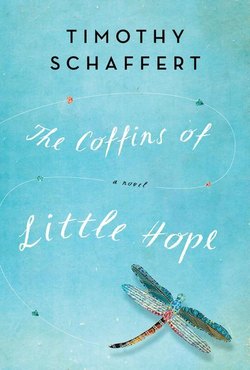Читать книгу The Coffins of Little Hope - Timothy Schaffert - Страница 16
На сайте Литреса книга снята с продажи.
· 10 ·
ОглавлениеTiff stopped eating then, and none of us noticed. We spent the summer, as usual, devoted to gluttony, grilling steaks and pillaging our vegetable gardens—frying green beans in bacon and grease, roasting sweet corn. I sliced cucumbers and onions and let them soak in sugar and vinegar, and Ivy used fresh beet juice to bloody the red velvet cakes she baked.
Then, into this summer idyll, the lifeguard of the swimming pool, a spunky, slight teenaged girl probably no stranger to anorexia herself, stopped by Doc’s to ask him if he’d noticed how sharp Tiff’s shoulder blades were looking lately, and how knobby her knees.
“I eat!” Tiff shouted, protesting beyond all reason when we confronted her at dinner. “I eat like a pig!” She oinked noisily, puffing out her cheeks, a childishness that was unlike her. As we looked at her then, we saw what we hadn’t been seeing—our girl turning skeletal. We’d been so distracted by our own obsessing over what was best for Tiff that we’d let her drop from our sights. Whenever Ivy had been at the table with us, which had been often that summer, we’d been embarrassed by her clumsy, coquettish pursuit of her daughter’s affections, and we’d looked everywhere but at each other, tracing our fingers over the monograms stitched into our napkins or watching the funhouse stretch of our reflections in the bowls of our spoons.
The night we accused her of starving herself, I asked her if she’d walk me to my door across the street. I linked my arm with hers, but she snatched hers back when she sensed me weighing the extent of her scrawniness, my fingertips considering the bone of her elbow.
“My sister, Lydia, quit eating one summer,” I recalled. “She insisted only on watermelon so she could pee it all away.” I hadn’t thought about it in years. Lydia had been a teenager, and though there’d been only five years’ difference between us, she’d seemed, in her distance and mystery, far more sophisticated than I’d sensed I’d ever be. The starvation had lent Lydia even more gravity and refinement, despite how peaked and sunken-cheeked she’d grown by August. “The only reason my father worried was because he thought no one would marry her because ‘Who wants to marry a girl who looks like an old lady already?’ Back then, nobody thought a girl like that might need some help. We just thought she was being stubborn. Nobody knew what anorexia was, or anything like that.”
Tiff stopped in the middle of the street, closed her eyes tight, and grabbed her head. “Oh. My. Gawwwwww-duh,” she wailed. “I am not anorexic.”
“No, no, no, I know, I know you’re not, sweetie,” I said, but I swiftly ended with my denial, uncertain whether I might be making matters worse. You can always make matters worse these days, no matter where your heart is. When I was a young parent, we never used the word parenting. The only bad parents were parents with bad children. Now a parent can be doing the wrong thing even when she’s doing the right thing. We’ve all come to know too well the psychology of childhood.
“I just get a stomachache sometimes,” she said. She sighed. “A firefly,” she said then, reaching up with her fingertip as if she might be able to tap its light back on.
“They’re as thick as mosquitoes this summer,” I said, and certainly, there they all were as we looked up and down the street, the insects’ slow, delicate sparks giving the evening its character. “I’m a terrible cook,” I said. “It’s as simple as that. That’s why you can’t eat. You’re being poisoned. Who could blame you?” Tiff rolled her eyes, and she took my arm and led me from the street and up my front walk. “Lydia could cook,” I said. “She even cooked for my daddy and me during her hunger strike. That summer that she was starving herself, she stuffed us to the gills. To distract us, maybe. I think we were half asleep half the time, we ate so much and so often. Oh, how Lydia could cook before she got old. If she could still cook, you’d eat. You’d gorge yourself.”
“You wouldn’t worry I was too thin; you’d worry I was too fat,” she said.
“I’d worry you were too fat, yes, probably,” I said, and as I touched again at her arm and felt her lean against me, I wondered if it were too wistful and naive to hope that Tiff might make it through life neither too fat nor too thin and perhaps entirely undamaged in general.
